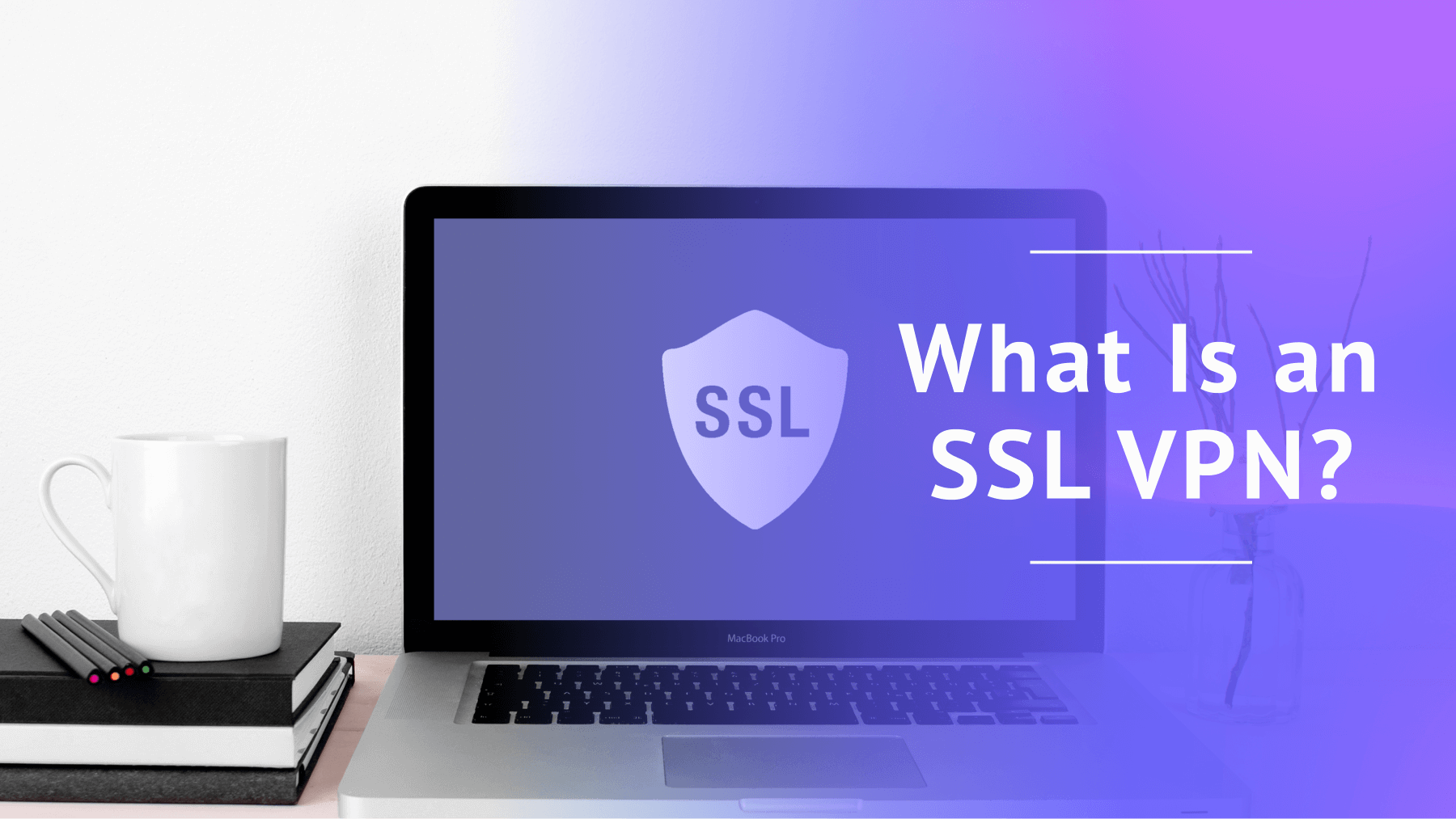
What Is an SSL VPN? Meaning, Types & How It Works Explanation in 2025
Quick Answer: What Is an SSL VPN?
An SSL VPN is a virtual private network that encrypts browser traffic, allowing secure remote access to private networks over the internet. They’re easy to set up, as they don’t require app installations and use standard encryption.
A VPN is a security service that encrypts internet traffic, keeping your personal information safe. Secure Sockets Layer (SSL) is an internet protocol that VPNs can use to authenticate connections and encrypt communications. Combining the two gives you an SSL VPN, which lets organizations set up secure channels for remote access without expensive hardware.
In this article, I will explore SSL VPNs, how they work, common types of SSL VPNs and their benefits and drawbacks. I will also compare SSL VPNs with similar alternatives. Take note that an SSL VPN is not a method for protecting 100% of your internet traffic — you’ll need one of the best VPNs from the commercial market for that.
Meaning: What Is an SSL VPN?
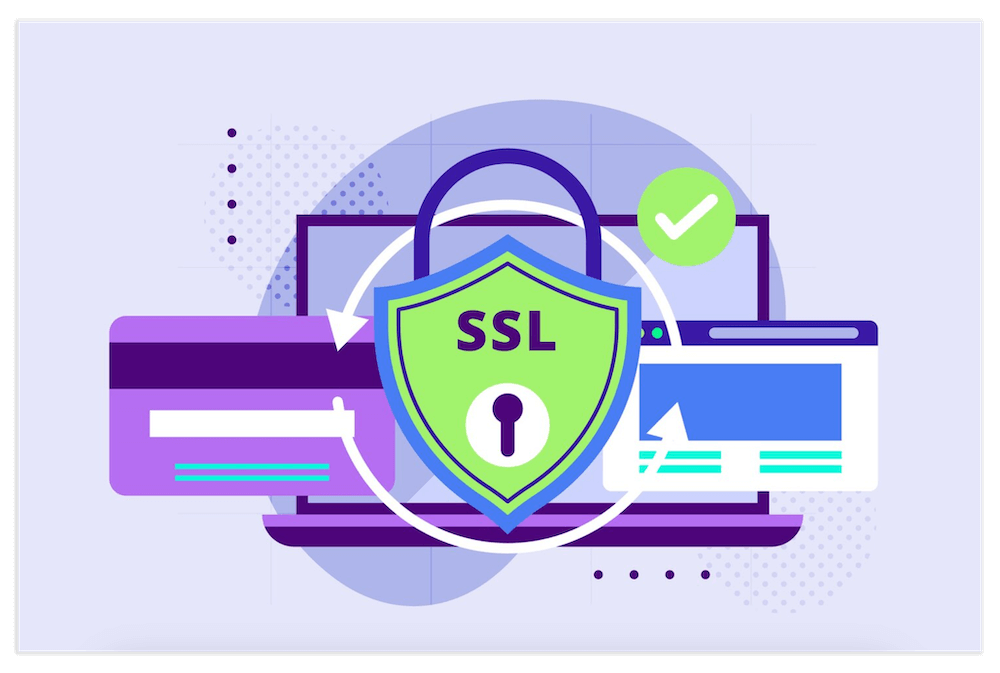
SSL VPN stands for “Secure Sockets Layer Virtual Private Network.” It is a type of virtual private network designed to provide users with secure remote access to private networks through an SSL protocol. An SSL VPN can be used to set up a remote-access VPN or any higher category for the four different types of VPNs.
The biggest benefit of SSL VPNs is that they don’t require the installation of specialized apps to function. SSL VPNs use ordinary web browsers, which almost everyone knows how to use. However, unlike commercial VPNs, SSL VPNs are used to access private devices, not the wider public internet.
SSL is actually shorthand for “SSL/TLS,” reflecting that TLS (Transport Layer Security) is the latest and best version of SSL. TLS was designed to replace earlier SSL versions like POODLE due to their vulnerability to cyberattacks. TLS is now the standard for encryption protocols that SSL VPNs use, though the term “SSL” has stuck.
Types of SSL VPN
There are two major categories of SSL VPNs. Both of them work for any of the reasons why you’d use a VPN, but they differ in the level of access they grant and the overhead required to set them up.
SSL Portal VPN
This type of SSL VPN permits a single SSL connection to a website. Once an SSL portal VPN authenticates you through a username and password, you can securely access resources hosted on a given private network using a regular browser. Employees commonly use SSL portal VPNs to remotely access corporate network resources.
SSL Tunnel VPN
SSL tunnel VPNs have a better range than SSL portal VPNs, as they’re not limited to browsers. They create a protected intermediary path between your device and a device with the VPN software installed, enabling access to multiple network services even if those resources aren’t online themselves.
One of the biggest advantages of using a tunnel VPN instead of a portal is that all of your internet traffic is encrypted, not just your browser traffic. However, you must install a VPN client on your computer to use an SSL tunnel VPN.
The key difference between SSL portal VPNs and SSL tunnel VPNs is that SSL portal VPNs are more convenient and only require a browser to work. However, SSL VPN encryption is limited to traffic routed through the established tunnel, so you can’t get online with total protection like you could with a commercial VPN.
How Does SSL VPN Appliance Work?
SSL VPNs use the following process to secure your internet traffic regardless of whether you’re using an SSL tunnel or portal VPN.
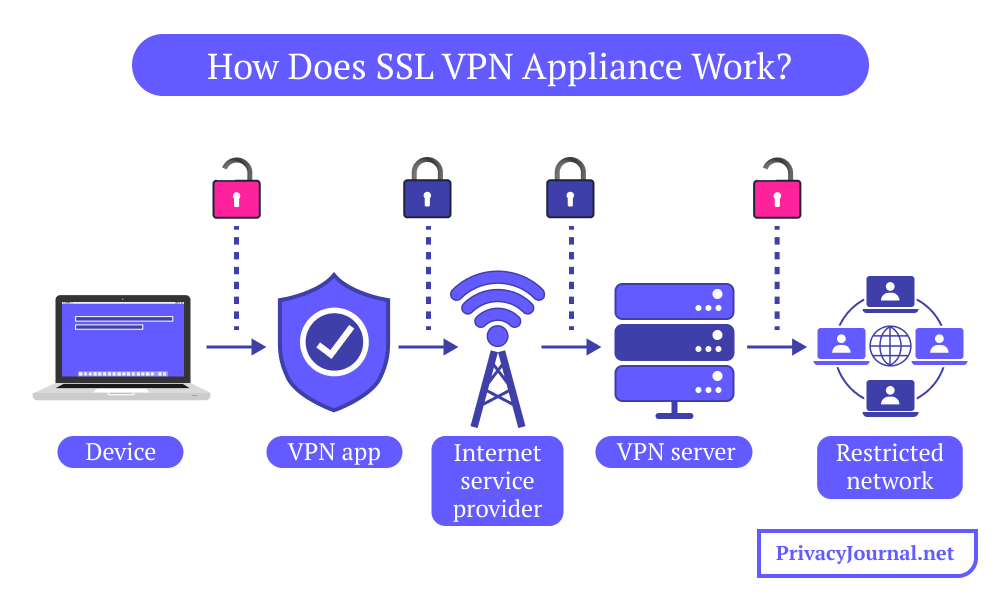
1. User Initiates Connection
The first step involves the user accessing a web portal (if using a portal VPN) or launching the SSL VPN software (if using a tunnel VPN).
2. User Authentication
The user provides their username and password to authenticate their identity to the SSL VPN server. Only authorized remote users can establish a VPN connection.
3. Establishment of a Secure and Encrypted Connection
With the authentication confirmed, the SSL VPN client and the destination device acting as a VPN server initiate a secure SSL/TLS connection through two processes.
- SSL handshake: The client and server negotiate the encryption parameters to be used. They exchange cryptographic keys, verify the server’s SSL certificates and agree on the session keys and encryption algorithms.
- Traffic encryption: After a successful SSL handshake, the server and the client encrypt the entire data stream passing between them. This protects the integrity and confidentiality of the data as it travels over the internet.
4. Data Transmission
The fourth step involves the user’s device sending and receiving data over the encrypted SSL VPN connection. The user can now access the permitted resources within the private network remotely from anywhere, including databases, files and applications.
5. Session Termination
Once the user completes the VPN session, they disconnect from the SSL VPN server. The termination process varies among VPN clients.
Benefits & Drawbacks of SSL VPN
No cybersecurity solution is completely foolproof, and though SSL VPNs have many benefits, they also have some drawbacks.
Advantages of SSL VPN
Here are the benefits of using SSL VPNs.
- High compatibility: The biggest appeal of SSL VPNs is their compatibility with TLS protocols supported by all standard browsers. TLS protocols are used on Firefox, Chrome, Safari and more, saving you the trouble of manual configurations. Furthermore, browsers have regular updates that ensure consistent security.
- Easy maintenance: SSL VPNs don’t require special drivers or software installations to work. You’re set as long as you have commonly used web clients.
- Reliable security: SSL VPNs keep your online traffic well protected. TLS’ standard encryption is among the best in the industry, so no one can intercept your online traffic. The authentication framework keeps unauthorized users from accessing sensitive files on private networks.
- Good for compliance: SSL VPNs are necessary for remote work in highly regulated industries. For example, businesses in the healthcare sector need SSL VPNs to comply with HIPAA-mandated security requirements — any channel used to exchange protected information must be encrypted to modern standards. This falls under HIPAA administrative safeguards, which include policies and procedures to manage access, authentication and transmission of electronic protected health information (ePHI).
Disadvantages of SSL VPN
SSL VPNs also have some drawbacks.
- Limited security coverage: SSL VPNs are limited to only their established channels, unlike regular VPNs that encrypt your entire device. Traffic through your browser portal is encrypted, but you won’t be protected if you access the internet using any other app.
- Slows down performance: Browsers are limited in what they can handle simultaneously, and the same applies when you use an SSL VPN. You may experience reduced performance when you handle large volumes of data.
- SSL tunnel VPNs can be costly: Though SSL tunnel VPNs provide a convenient way to access resources on your business network, setting them up requires VPN clients and firewall vendors. The costs can pile up for larger organizations.
SSL VPN vs IPsec VPN
IPsec (Internet Protocol Security) VPNs were used to create secure connections before SSL VPN technology was widely adopted. Like SSL VPNs, IPsec VPNs encrypt your online traffic, but they’re much less convenient overall. You can learn more about IPsec in our VPN protocol breakdown.
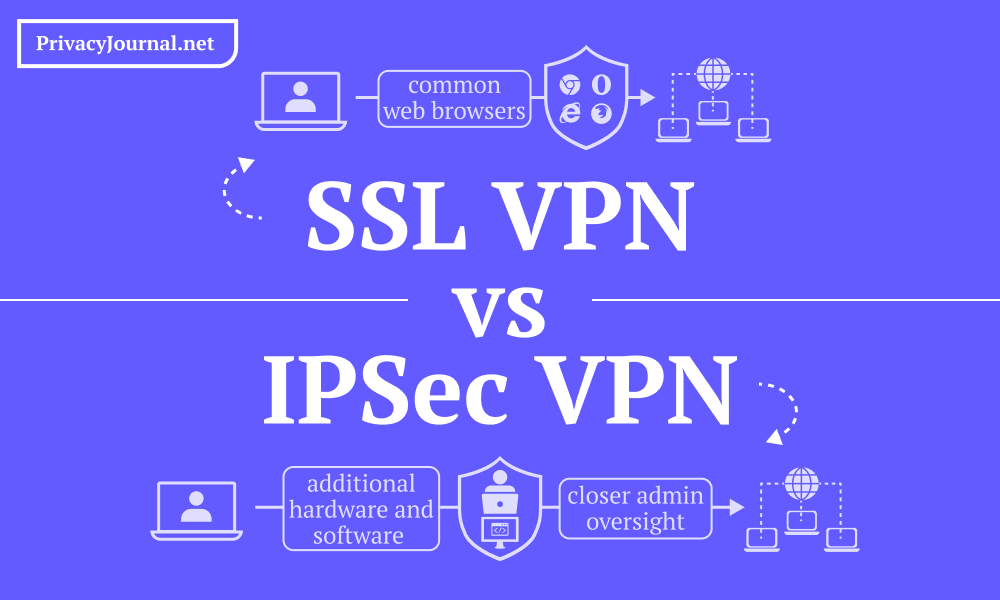
Client Software
SSL VPNs are mostly browser-based and don’t require additional app installations in order to work. IPsec VPNs require both specialized software and hardware, plus much closer monitoring by a network administrator. Depending on the scale of your setup, you may also need to configure each user’s endpoint and procure software licenses.
Access Control
Configuring which parts of a private network an individual can access is easier with an SSL VPN than with an IPsec VPN. SSL VPNs can be tailored to provide different levels of access to users on the same network.
IPsec gives everyone equal control, which is risky — having too many people accessing sensitive areas of a network isn’t ideal. You can set up privileges for each account using IPsec VPNs, but it’s tedious and costly.
Encryption Approach
Though both VPNs encrypt traffic, they apply encryption on different levels. An IPsec VPN protocol secures your data at the network layer. Therefore, all IP packets are encapsulated when transmitted to ensure everything is protected from potential interceptions.
SSL VPNs handle the application layer, providing selective encryption for specific web services and applications instead of for all network packets. This is a more cost-effective method overall.
Why Are SSL VPNs Important?
SSL VPN technology allows businesses to rapidly establish safe access for remote workers. The COVID-19 pandemic was a defining moment for most businesses, and those that quickly adapted to remote work managed to do so largely by adopting SSL VPNs.
SSL VPNs are an appealing and necessary technology for organizations that want to keep their wheels moving no matter where their employees are. Knowing that a network is well secured from both ends allows companies to hire employees from anywhere in the world and share their network resources without worrying about security.
What Is SSL VPN Used For?
SSL VPNs have a wide range of uses, including authentication, business scaling, security checks and centralized access control.
Adding an Extra Layer of Authentication
Remote access relies on SSL VPNs to handle what humans cannot, verifying that users are who they claim to be. Since the devices used to access private network services are unsupervised, SSL VPNs’ native authentication capabilities significantly reduce the chances of unauthorized individuals accessing a private network.
Scaling Up Businesses
Hiring remote talent from other locations is a cost-effective way of upscaling a business. Instead of upgrading the physical space to accommodate new hires, businesses can use SSL VPNs to provide secure remote access. This also allows the business to access talented employees that don’t live near its offices.
Security Checks
SSL VPNs are reliable for integrity checks on security systems. They scrutinize inbound and outbound traffic, verify identification credentials and give network administrators great control over who can access the network. SSL VPNs can even be designed to detect jailbroken devices and block them before the entire network is compromised.
Centralized Access Control
SSL VPNs give network administrators precise control over who can access the network and which parts they can see. They can set boundaries that make it easy to immediately pinpoint where a breach is coming from and deal with it before it causes further damage. This level of control also makes it easy to revoke access if a user is fired or quits.
Top Firewall Vendors
A firewall vendor is a security service provider that monitors network traffic for signs of threats. Many of them provide SSL VPN services, along with features like deep packet inspection for filtering data packets, antispam for catching scam emails and antimalware for dealing with dangerous apps and viruses.
Here’s a quick overview of the top firewall vendors.
- WatchGuard: Best overall, with security automation
- Cisco Secure Firewall: Flexible enterprise options
- SonicWall: All-around security suite
- Palo Alto Networks: Best for large businesses
WatchGuard — Best Overall, with Security Automation

WatchGuard is a unified security platform that provides security through end-to-end encryption for organizations’ networks. It gives network admins full control over the levels of access each remote user can have. Furthermore, it is equipped with automated threat modeling, detection and remediation that constantly monitor the network for hidden threats.
Cisco Secure Firewall — Flexible Enterprise Options

When providing security solutions for every level of business, very few alternatives can beat Cisco Secure Firewall. It has reliable hardware designed for different levels of companies, from small ventures to large corporations with multiple devices each day that need access to secured systems.
Additionally, Cisco Secure Firewall uses AI to speed up and automate network monitoring tasks. This frees up cybersecurity teams, allowing them to focus on more critical issues.
SonicWall — All-Around Security Suite
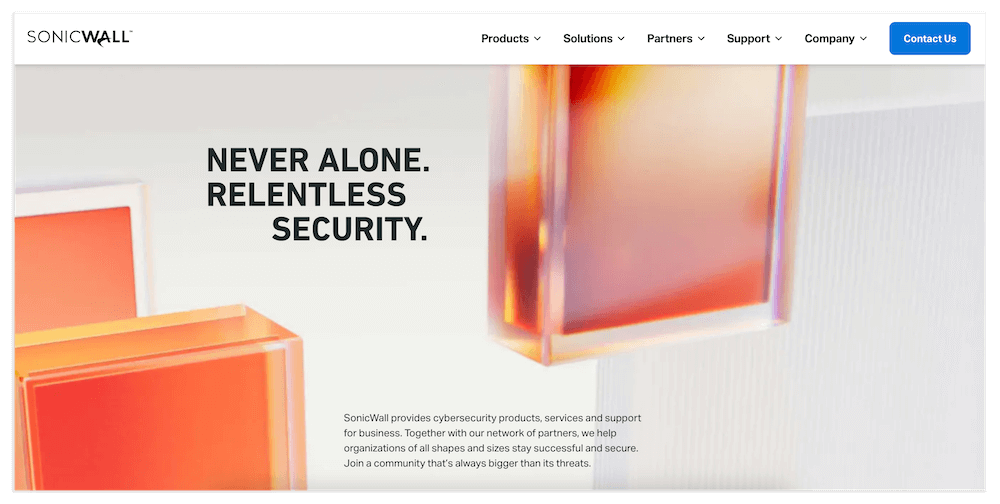
SonicWall takes business security to the next level by combining SSL VPN services and built-in security features. For example, Gateway Security Services offers real-time protection against malware. SonicWall also offers Capture Advanced Threat Protection (ATP), which defends the network against external attacks.
Palo Alto Networks — Best for Large Businesses

Palo Alto Networks is another firewall vendor with a wide range of security products and solutions ideal for large businesses. These include network security solutions like zero-trust network access, cloud secure web gateway, SSL VPNs, data center security and more.
FAQ: SSL VPN Service
What Is the SSL VPN?
SSL VPN stands for “Secure Sockets Layer virtual private network.” It uses SSL/TLS protocols to allow remote access to secure resources through web browsers or VPN client apps.What Is SSL VPN vs Regular VPN?
SSL VPNs allow access to specific resources through browser pages or client apps, while regular VPNs encrypt all of your online activity through any app.Is SSL VPN Better Than IPsec?
SSL VPNs are similar to IPsec in terms of the encryption they provide. However, IPsec VPNs require additional software and hardware to work. SSL VPNs are more cost-effective, as they work through the same protocols as web browsers, requiring much less overhead.What Is the Disadvantage of SSL VPN?
The main disadvantage of SSL VPNs is that they’re limited to securing access to a specific private network. Unlike a commercial VPN, they won’t protect you when you use the internet as normal, and they can’t encrypt traffic through other web-capable apps.

Leave a Reply